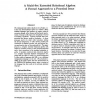221 search results - page 3 / 45 » Heyting Algebras and Formal Languages |
UML
2001
Springer
13 years 12 months ago
2001
Springer
: There are several reasons to specify UML models in a formal way The most important are to avoid inconsistencies and ambiguities and to do verification and forecasting of system p...
ICDE
1994
IEEE
13 years 11 months ago
1994
IEEE
The relational data model is based on sets of tuples, i.e. it does not allow duplicate tuples in a relation. Many database languages and systems do require multi-set place, the hi...
DLT
2009
13 years 5 months ago
2009
A famous theorem of Kuratowski states that, in a topological space, at most 14 distinct sets can be produced by repeatedly applying the operations of closure and complement to a gi...
SIGMOD
2008
ACM
14 years 7 months ago
2008
ACM
This article proposes a core query algebra for probabilistic databases. In essence, this core is part of the query languages of most probabilistic database systems proposed so far...
RP
2009
Springer
14 years 1 months ago
2009
Springer
Abstract. We compare several languages for specifying Markovian population models such as queuing networks and chemical reaction networks. These languages —matrix descriptions, s...

